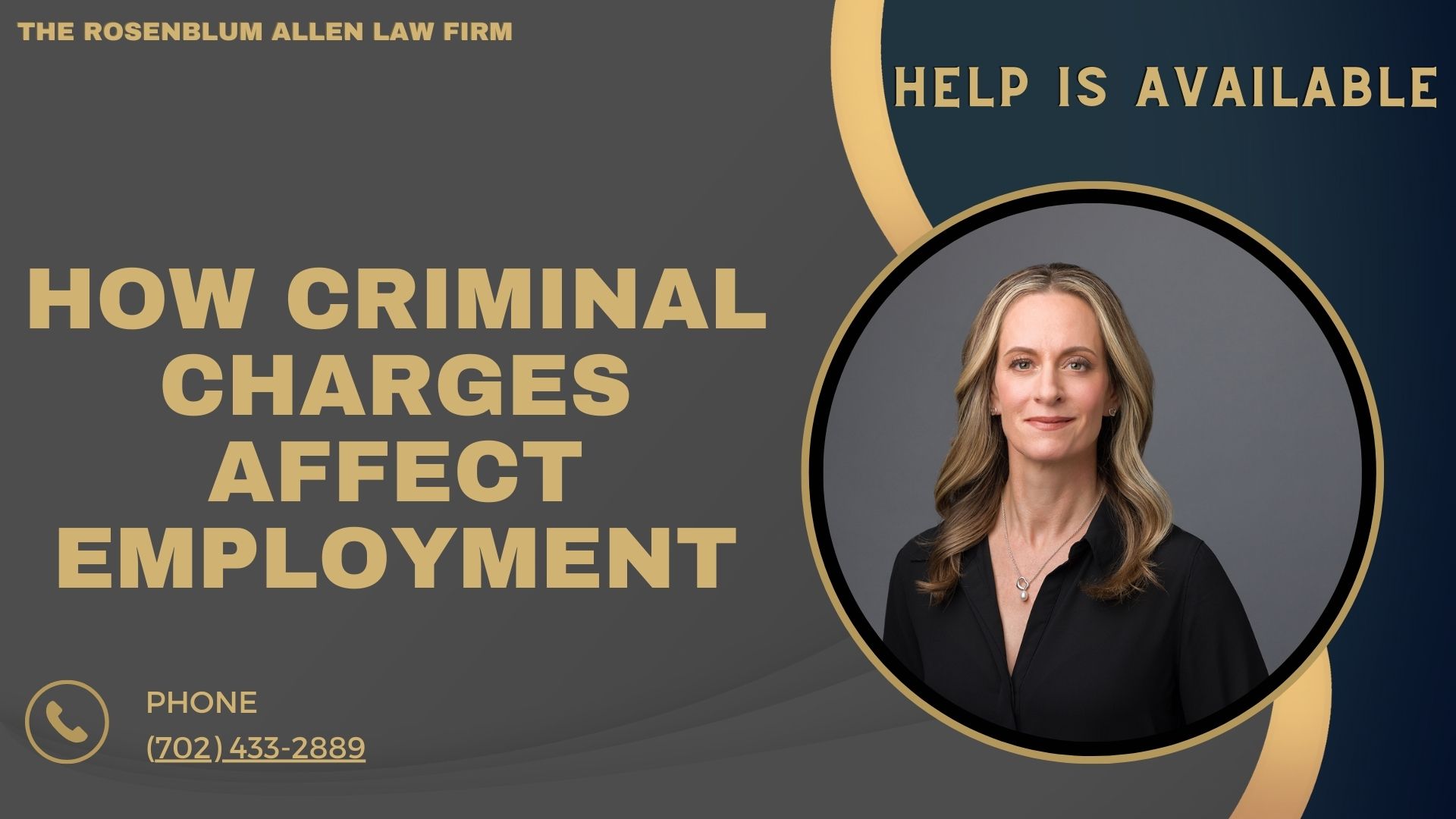Facing criminal charges can feel overwhelming, especially considering how it might affect your job prospects. Whether you’re applying for a new position or worried about your current employment, understanding the impact of criminal charges is essential. Let’s break down what you need to know.
Note: Make sure to also check out our How a Criminal Record Can Impact Your Future post while you’re here.
Understanding Criminal Charges and Their Impact on Employment
Criminal charges can cast a long shadow over your professional life. Even if the charges don’t lead to a conviction, their presence on your record can change how employers view you. This section will explore criminal charges and how they can affect your employment status.
Explanation of Criminal Charges
Criminal charges are formal accusations by a government authority alleging that someone has committed a crime. These charges can range from minor infractions to serious felonies, and their severity often dictates how they impact your job prospects.
- Types of Charges: Misdemeanors, felonies, infractions.
- Severity Levels: Minor infractions may carry lesser impacts, while felonies can have severe employment consequences.
- Stages of Charges: Being charged, awaiting trial, conviction, or acquittal — each stage can impact employment differently.
Immediate Effects on Job Prospects
When criminal charges appear, they can affect how potential employers perceive you. Here’s a look at some immediate impacts:
- Negative Perception: Employers may see charges as a sign of unreliability or a potential risk.
- Missed Opportunities: Some employers may only accept your application outright with further consideration.
- License and Certification Issues: Some professions, like healthcare or finance, may restrict licensure for individuals with specific charges.
How Criminal Charges Affect Job Applications
Job hunting is stressful enough, but having criminal charges can add an extra layer of complexity. This section will explore how charges play a role in the job application process, from disclosure requirements to background checks.
Disclosure Requirements
One of the first hurdles is determining when and how to disclose your criminal history.
- Laws on Disclosing Criminal History:
- In some states, you must disclose criminal charges, while others have laws protecting applicants from revealing specific details too early.
- Employer Rights to Inquire About Criminal Records:
- Employers often have the right to ask about your criminal history, but the extent of this right can vary. Some may only be able to inquire about convictions, not charges.
Background Checks
Background checks are a standard step in the hiring process. Employers use them to verify your identity, qualifications, and criminal history.
- Common Types of Background Checks:
- Criminal history checks: Reveal past charges and convictions.
- Credit checks: Sometimes used to gauge financial responsibility.
- Employment history checks: Confirm past job details.
- How Charges Show Up in Background Checks:
- Depending on the state and type of charge, charges can show up even if they did not lead to a conviction. Some charges might fall off after a certain period, but others remain permanently.
Application Rejections
Criminal charges can be a significant factor in why applications are rejected. Understanding these reasons can help you better prepare.
- Common Reasons for Rejection:
- Charges seen as a risk to company reputation.
- Concerns about trustworthiness, especially in roles handling sensitive information or money.
- Company policies that automatically disqualify candidates with specific charges.
- Employers’ Perception of Criminal Charges:
- Charges related to theft or fraud are often viewed as red flags.
- Violent charges can raise safety concerns.
- Drug-related charges might affect positions requiring sobriety.
This approach helps job seekers understand the implications and guides them on navigating applications in a way that puts their best foot forward.

Criminal Charges and Current Employment
Criminal charges don’t just affect job seekers; they can also impact those already employed. New criminal charges can create uncertainty even if you’ve been with a company for years. Let’s explore how charges can affect your current job and what you can expect.
Employer Policies on Criminal Conduct
Every company has its own policies regarding employee behavior, especially criminal conduct. Knowing where your employer stands is essential.
- Company Policies on Criminal Charges:
- Many employers have guidelines for handling criminal charges against employees. Some may have a zero-tolerance policy, while others may consider the nature and timing of the charges.
- Employment Contracts and Clauses About Criminal Behavior:
- Your employment contract may include specific clauses regarding criminal activity. These clauses often allow the employer to take disciplinary action, including termination, if you’re charged with a crime.
- Mandatory Reporting Requirements:
- Some jobs, especially those in regulated industries like finance or healthcare, require employees to report criminal charges immediately. Failure to do so can result in termination.
Consequences of New Charges While Employed
Facing new charges while employed can lead to a range of consequences, depending on your employer’s policies and the severity of the charges.
- Suspension or Termination Risks:
- Employers may significantly suspend you while reviewing the charges if they directly impact your role. Sometimes, termination may be immediate, especially if the charges conflict with company values or policies.
- Impact on Professional Reputation:
- Criminal charges can damage your reputation within the workplace. Colleagues may view you differently, and your career growth could stall.
- Licensing and Certification Issues:
- Criminal charges can trigger a review of your eligibility to hold a professional license for roles that require a professional license. This can lead to suspension or loss of licensure, impacting your ability to continue working in your field.
Types of Criminal Charges and Their Specific Employment Impacts
Not all criminal charges are viewed the same way by employers. The type of charge can significantly affect your employment prospects. Here’s a closer look at how different charges can impact your job search or current role.
Misdemeanors vs. Felonies
Understanding the difference between misdemeanors and felonies is critical to assessing the impact on employment.
- Misdemeanors:
- Misdemeanors are less severe offenses like petty theft, disorderly conduct, or minor drug possession. While these charges are less severe, they can still raise concerns, especially if they are recent or directly related to the job.
- Felonies:
- Felonies are serious crimes like assault, robbery, or fraud. These charges are often viewed as major red flags. Felony charges can severely limit job opportunities, especially in industries requiring high trust or public interaction.
- Employment Implications:
- Misdemeanors: These may still allow for employment opportunities but can affect roles with strict conduct standards.
- Felonies Often lead to disqualification from many roles, particularly those in sensitive fields like education or finance.
Drug-Related Offenses
Drug-related charges can be particularly problematic for job seekers and employees, especially in industries with strict drug policies.
- How Drug Charges Affect Job Prospects:
- Drug charges, even for minor offenses, can make employers question your reliability. Jobs that require drug testing or involve handling sensitive information may be off-limits.
- Industries Sensitive to Drug Offenses:
- Healthcare: Medical facilities have zero-tolerance policies.
- Transportation: Driving or operating heavy machinery jobs often disqualify candidates with drug charges.
- Public Safety: Law enforcement and security roles typically have stringent drug policies.
Theft, Fraud, and Financial Crimes
Charges related to theft, fraud, or other financial crimes are especially damaging when applying for jobs that require trust and economic responsibility.
- Impact on Trust-Based Roles:
- Employers are often unwilling to hire someone with a history of financial crimes for roles involving cash handling, bookkeeping, or access to sensitive financial data.
- Challenges in Finance or Accounting:
- These fields are particularly cautious, often conducting deep background checks that flag any relevant criminal charges.
Violent Offenses
Violent offenses carry significant weight in hiring decisions, often leading to outright rejection for roles that involve customer interaction or security.
- Impact on Public-Facing Roles:
- Violent charges raise safety concerns for positions that involve working with the public, such as retail, hospitality, or healthcare.
- Jobs Requiring Security Clearance:
- Roles that require background checks for security clearances, such as government positions or sensitive corporate roles, are likely to be out of reach for individuals with violent charges.

Industries Most Affected by Criminal Charges
Not all industries treat criminal charges the same way. Some are stricter due to the nature of the work, regulations, or public safety concerns. Let’s explore which industries are most impacted by criminal charges and why.
Healthcare
Healthcare jobs often involve working with vulnerable populations, handling sensitive information, and maintaining trust. As a result, this industry has some of the strictest rules regarding criminal charges.
- Licensing Issues and Restrictions:
- Many healthcare roles, from nurses to medical assistants, require state licenses. A criminal charge can lead to license denial, suspension, or revocation.
- Patient Safety Concerns:
- Charges, especially those involving violence or drugs, can raise red flags. Employers prioritize patient safety and often won’t risk hiring someone with a questionable background.
- Background Checks for Healthcare Workers:
- Healthcare employers typically run extensive background checks, sometimes including fingerprinting and drug testing. Charges that might be overlooked elsewhere are scrutinized heavily in this field.
Education
Working in education means being around children or young adults, which comes with high standards of conduct. Schools and educational institutions prioritize safety, making securing employment challenging for individuals with criminal records.
- Background Checks and Working with Minors:
- Schools are required by law to perform background checks on all staff. Charges involving violence, drug use, or crimes against minors can disqualify you immediately.
- Licensing and Certification Issues:
- Teachers and other educational staff often need certifications or state licenses. Criminal charges can result in denial or revocation, making it impossible to work in the field.
- Trust and Safety Concerns:
- Even minor charges can raise concerns in educational settings. The priority is always on maintaining a safe environment for students.
Finance and Banking
The finance industry handles sensitive financial data and large sums of money, prioritizing trust. This sector often imposes strict regulations on employees, particularly those in roles related to accounting, banking, or investment.
- Regulatory and Fiduciary Responsibilities:
- Financial institutions are heavily regulated, and employees must often pass stringent background checks. Charges related to fraud, theft, or financial misconduct are usually deal-breakers.
- Impact on Hiring for Financial Roles:
- Roles like accountants, auditors, and investment advisors face intense scrutiny. Even misdemeanors can jeopardize job prospects.
- Risk of Losing Certifications:
- Certifications such as CPA or CFA can be at risk if criminal charges arise, affecting current employment and future career opportunities.
Government Jobs
Government positions, especially those with security clearances or public-facing roles, are highly selective regarding criminal history. The stakes are high, and even minor charges can be a barrier.
- Security Clearances and Disqualification:
- Jobs that require access to sensitive information or classified material often involve extensive background checks. Charges involving dishonesty, violence, or drugs can disqualify candidates.
- Public Trust and Accountability:
- Government employees are held to high standards because they serve the public. Charges that question integrity or reliability can end career opportunities in this sector.
- Employment Restrictions Based on Charges:
- Some government roles have legal restrictions on hiring individuals with specific charges, particularly in law enforcement or regulatory bodies.

Legal Protections and Rights for Job Seekers with Criminal Records
Knowing your rights is essential if you have a criminal record. Laws and policies are designed to help people with criminal records find work. Here’s what you need to know about legal protections that could help you.
Ban-the-Box Laws
“Ban-the-Box” laws aim to give applicants with criminal records a fair chance by removing the criminal history question from initial job applications. These laws delay background checks until later in the hiring process.
- Overview of Ban-the-Box Legislation:
- These laws prevent employers from asking about criminal records on job applications. The goal is to ensure candidates are judged first on their skills and qualifications.
- States and Cities with Ban-the-Box Laws:
- Many states and cities across the U.S. have adopted Ban-the-Box policies. Some apply to public employers only, while others extend to private companies.
- Impact on Job Seekers:
- These laws don’t erase your criminal history but give you a better chance to make a good first impression before your background comes into play.
Fair Chance Hiring Policies
Fair Chance Hiring goes beyond Ban-the-Box, promoting the consideration of candidates with criminal records based on their merits.
- Explanation of Fair Chance Hiring Initiatives:
- These policies encourage employers to evaluate job applicants as individuals, considering factors like the nature of the offense, how much time has passed, and evidence of rehabilitation.
- Employer Obligations Under These Policies:
- Employers are encouraged and sometimes required, to consider criminal history only after making a conditional job offer. This ensures that the decision-making process is fairer.
- Benefits for Job Seekers:
- Fair Chance Hiring can lead to more interviews and job offers. Employers who follow these policies may be more open to giving you a second chance.
How to Improve Employment Prospects After Criminal Charges
It’s not easy, but you can improve your job prospects even with a criminal record. Here are some steps to boost your chances of finding meaningful employment.
Sealing or Expunging Records
Sealing or expunging your criminal records can significantly improve employment opportunities by removing or limiting access to your charges.
- Eligibility for Expungement or Sealing of Records:
- Eligibility varies by state and depends on the nature of your charges. Non-violent and minor offenses are more likely to qualify.
- How to Start the Process:
- Seek legal advice to understand your options. The process usually involves filing a petition, which can take some time, but the benefits are often worth it.
- Benefits of Sealing Records:
- Once sealed, your charges won’t appear on most background checks, opening up more job opportunities.
Getting Professional Help
Sometimes, navigating employment with a criminal record requires professional assistance. Feel free to seek help from those who specialize in this area.
- Role of Legal Counsel in Navigating Employment Issues:
- An attorney can help you understand your rights, assist with record sealing, and provide advice tailored to your situation.
- Importance of Employment-Focused Legal Advice:
- Legal professionals can guide you through potential employment barriers and advocate if issues arise.
Honesty and Rehabilitation Efforts
Being honest about your past and showing genuine efforts toward rehabilitation can significantly affect how employers view you.
- Importance of Honesty on Applications:
- If asked, always be truthful about your criminal history. Misrepresentation can lead to automatic disqualification or termination if discovered later.
- Showcasing Rehabilitation and Personal Growth:
- Highlight positive changes since your charges, like completing rehabilitation programs, earning certifications, or engaging in community service. These efforts can demonstrate your commitment to moving forward.

Breaking It All Down
Navigating the job market with criminal charges can be challenging, but it’s not impossible. Understanding how these charges affect your employment opportunities is the first step in overcoming the hurdles. From knowing how different types of charges impact various industries to leveraging legal protections, you can find a path forward.

Frequently Asked Questions
Can an employer fire me for being charged with a crime, even if I'm acquitted?
Yes, employers can terminate employment based on criminal charges, especially if it violates company policies or affects your ability to perform your job. Termination policies vary by employer and are often detailed in your employment contract.
Do I have to disclose my criminal charges during a job interview?
It depends on your location and the job. Some jurisdictions have Ban-the-Box laws that prevent employers from asking about criminal history during initial interviews. However, if asked directly later in the process, it’s important to answer honestly.
Will my charges show up if they were dropped or dismissed?
Yes, charges dropped or dismissed can still appear on background checks. However, you can often explain these outcomes to potential employers to minimize their impact.
How long do criminal charges stay on my record?
The length of time charges stay on your record varies based on the type of charge and local laws. Some charges can be expunged or sealed, but others may remain indefinitely unless you take legal steps to remove them.
Can I work in healthcare with a criminal record?
It depends on the nature of the charges and the specific job role. Certain charges, especially those involving violence or drugs, can disqualify you from healthcare positions. However, each case is evaluated individually, and some roles may still be accessible with proper licensing and rehabilitation efforts.
Are employers allowed to perform background checks without my consent?
No, employers must obtain your consent before conducting a background check. If you refuse, it may impact your chances of being hired, as many employers require background checks as part of their hiring process.
How can I explain my criminal charges to a potential employer?
Be honest and direct, focusing on what you’ve learned and how you’ve grown since the incident. Highlight any rehabilitation efforts, such as completing a program, volunteer work, or additional training demonstrating your commitment to moving forward.
Can expunged charges still affect my job prospects?
Once charges are deleted, they should not appear on most standard background checks, which can improve your job prospects. However, some high-level security or government roles may still have access to expunged records.
Will I be disqualified from government jobs if I have a criminal record?
Not necessarily. The impact depends on the nature of the charges and the specific job requirements. Some government roles have strict disqualification criteria, especially those requiring security clearance, but others may consider your application on a case-by-case basis.
What can I do if my criminal record unfairly affects my job prospects?
Consider consulting with an attorney who specializes in employment law or criminal records. They can help you understand your rights, explore options for expungement, and offer guidance on how to present your situation to potential employers.
Do I have any rights if I am discriminated against because of my criminal record?
Yes, some states have laws protecting individuals from discrimination based solely on criminal records, mainly if the offense is irrelevant to the job. Knowing your rights can help you address potential discrimination legally and effectively.

Additional Resources for You from The Rosenblum Allen Law Firm.
In addition to helping with appeals, our lead attorney, Molly Rosenblum Allen, Esq., has created various resources to support you in other legal matters:
Criminal Defense Attorneys: Effective defense for a wide range of criminal charges to protect your rights and future.
Las Vegas DUI Lawyer: Specialized guidance and defense strategies for those facing DUI charges in Las Vegas.
Domestic Violence Lawyer Las Vegas: Compassionate and experienced legal support for domestic violence cases, focusing on protecting your rights.
Drug Possession Lawyer: Aggressive defense for drug possession charges to minimize the impact on your life.
Sex Crimes Attorney: Dedicated representation for sensitive and serious sex crime allegations.
CPS Defense Attorney: Defense against Child Protective Services actions, protecting your family and parental rights.
Misdemeanor Lawyer: Guidance through the legal process for misdemeanors, aiming for the best possible outcomes.
Las Vegas Warrant Defense Attorney: Help with clearing warrants and addressing related legal issues promptly and efficiently.
Las Vegas Probation Violation Attorney: Skilled defense for probation violations to help you avoid harsh penalties.
Theft Crime Defense Lawyer: Representation for theft charges, focusing on reducing charges or dismissing your case.
Kidnapping Lawyers: Effective legal defense for kidnapping charges, prioritizing your rights and freedom.
Juvenile Defense Lawyers: Protecting the rights of minors facing legal challenges, aiming for solutions that support their future.
Firearms Lawyer Las Vegas: Defense for firearm-related charges, ensuring your second amendment rights are upheld.
These resources are designed to provide you with the knowledge and support needed to navigate these challenging legal issues.

Offsite Resources for You
American Bar Association (ABA): https://www.americanbar.org/
The ABA provides extensive resources and information on the legal process, including articles and guides on appeals and other legal topics.
National Association of Criminal Defense Lawyers (NACDL): https://www.nacdl.org/
NACDL offers resources and advocacy for criminal defense attorneys and individuals facing criminal charges, including insights on appeals.
Nevada Judiciary: https://nvcourts.gov/
The official website of the Nevada Judiciary provides direct access to court information, forms, and procedures for appeals and other legal processes.
FindLaw: https://www.findlaw.com/
FindLaw offers a comprehensive collection of legal articles, case law, and guides on various legal topics, including the appeals process.
Justia: https://www.justia.com/
Justia provides free access to a wide range of legal information, including resources related to appeals and Nevada-specific legal issues.
Martindale-Hubbell: https://www.martindale.com/
Martindale-Hubbell offers lawyer directories and legal articles, helping individuals connect with qualified attorneys and learn more about the appeals process.
National Center for State Courts (NCSC): https://www.ncsc.org/
NCSC provides information on court systems, including appeals processes, court administration, and resources for those involved in legal proceedings.

A Special Message from Our Lead Attorney, Molly Rosenblum Allen, Esq

Thank you for taking the time to read through our resources. Navigating legal challenges, especially when you’re far from home, can be overwhelming, but you don’t have to go through it alone. If you need help with your situation or have any questions, please don’t hesitate to reach out. Give me and my team a call at (702) 433-2889, and let’s get the ball rolling. We’re here to support you every step of the way.
Looking forward to speaking with you soon!






